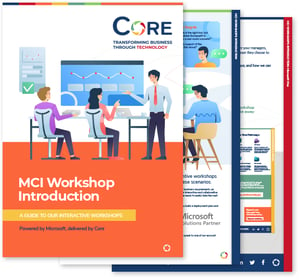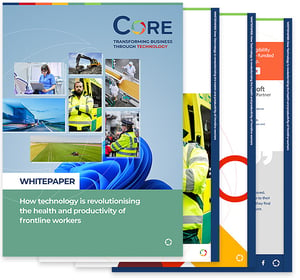The era of austerity has resulted in profound challenges for local and regional government, as it has for many other industries, communities and families.
According to a report by the National Audit Office, local councils have seen their central government funding reduced by nearly half in real terms since 2010, while the Institute for Fiscal Studies places the average total cuts to local government budgets since 2010 at 26%.
Despite this reduction in funding, demands on public services continue to grow and change, as the population grows average life expectancy increases, and society becomes more accustomed and expectant of instant or accelerated delivery of services, including those provided by local and regional government.
Technology can be used to preserve species or output levels while reducing costs, however, it is more effective as an opportunity to innovate and reinvent services. In local and regional government, sensible investment, planning and innovation can mean faster, better and more accessible services than before, even in times of austerity.
Here are five opportunities for technology innovation in local and regional government.
Machine learning and data analytics
UK Prime Minister Theresa May has been open in her commitment and support for making the UK a world leader in Artificial Intelligence. There are several local and regional government organisations that have been exploring this for years.
Machine Learning is an area of work within the larger field of Artificial Intelligence and is concerned with using algorithms to analyse data to generate insights, make predictions and improve decision making without the need to programme every single action.
Local and regional governments currently collect and store data from a range of sources in disparate systems, making analysing and interpreting this data a significant challenge. This results in a missed opportunity to achieve a deeper understanding of the individual citizen and improve the accuracy and speed of decisions for their needs and circumstances.
Local and regional government responsibilities cover a range of complex and coordinating services, requiring a proportionate frequency of departments and software applications to deliver them. Though these services are delivered by separate departments, organisations and individuals, there is a very clear case to be made for these organisations to share data and use it to improve the speed of service and quality of decisions made.
By capturing, sharing and understanding the data more effectively, it is easier to ensure citizens get the care and support they require, as well as easing the pressure on other departments who may have been unnecessarily consulted and involved due to a lack of understanding or communication.
Machine learning offers the potential for significant structural cost reductions through a simple integration process, reducing the pressure on services and enabling better decision making.
Automation and interaction with citizens
As citizens become increasingly comfortable with new forms of communication and interaction, the adoption of services such as chatbots, mobile applications and social media become opportunities to engage more with citizens and deliver an improved service.
There are certain services, processes and transactions provided by local and regional government which do not require, at least initially, the involvement of a human. Initial contact with a citizen can therefore be handled by automated workflows and chatbots, a form of narrow artificial intelligence which can automate task-based processes, identify patterns and deal with high volume requests more efficiently than a human being. This could include the payment of parking fines and council tax, or applications for business licenses and parking permits.
Several local and regional government organisations in the UK have already trialled and adopted new forms of handling citizen queries, which improve the efficiency, consistency and delivery of these low-level tasks, as well as improving customer experience.
There are of course interactions so complex that they must be performed by humans, as well as those that citizens generally demand be conducted by humans. Automation is useful for low level functions and the initial interactions that are repetitive and impersonal in nature, freeing up human resources to address the more creative and complex challenges facing Local Government and the citizens they serve.
It is therefore an area of technology which has the potential to benefit both staff and citizens, working in the background to support employees in their roles, free up resources to focus on more complex tasks, improve customer experience and provide significant citizen insight.
Core have significant experience creating workflows for central and local government organisations, to automate transactions on the web and enable improved use of resources and faster resolutions for citizens.

Identity and the Cloud
Since the dawn of networked computers, Identity has been a security and productivity consideration for organisations to contend with. However, the proliferation of Cloud based platforms employed to deliver key business functions has increased the need for a robust Identity Access Management solution as part of an IT enterprise.
Adoption of the Cloud has clear benefits to an organisation, enabling mobile working and more flexible costs, with no up-front expenditure required and no associated costs to maintain, store and power servers.
With the increased adoption of Cloud platforms, as well as the ability for users to have mobile devices and work from home, the relative simplicity of protecting information inside a walled secure on-site infrastructure and provisioning and deprovisioning user access through site access and devices is no longer feasible. This is further complicated by the fact that each business function in an organisation often has its own independent Cloud Platform, which means separate login and password credentials, causing inconvenience for the user and an increased security risk through weak or shared passwords.
Identity Access Management provides a simple but secure Single Sign On to permit access to all approved cloud platforms, delivering access to approved cloud applications without entering each application’s specific user name and password credentials. Depending on the security needs of the customer, onward authentication policies can be set up and managed.
Local and regional government have been embracing shared services for several years now, to achieve increased collaboration and connectivity, as well as structural cost savings. This consolidation of multiple Active Directory Forests creates several challenges, including issues in consistency between Active Directory components, duplication, third party applications and the method of migration.
Identity Access Management offers an effective solution to these complex problems of interoperability, using fixed policies to ensure consistency of identities for both new and remediated users. By providing a single management layer, IDAM enables you to see the entire estate of Active Directories and allows admins to manage a lot of the activities from one portal with a full audit trail of activity.
Traditionally, on-premise infrastructure made it relatively simple to provision and deprovision users behind the organisations firewall and physical security, making suspicious or unsanctioned access easier to identify and neutralise.
The combination of flexible mobile working, shared services and outsourcing to individuals and companies means Identity Access Management is an increasingly integral solution. From a practical, security and financial perspective, there is a compelling argument to replace laborious and time consuming manual processes with automation, to provision, deprovision and re-harvest software licenses from those users who leave or change roles.
While many organisations have traditionally managed Identity manually, or even neglected it, the advent of multiple Cloud platforms, mobile working and an increased complexity and volume of cyber-attacks, errors in these processes can result in a significant security risk, either through hackers or former employees continuing to have access to highly sensitive personal data, a contravention of GDPR.
Security
Recent cases demonstrate that public sector organisations face the same level and sophistication of threats from hackers as their private sector counterparts. Be it large scale ransomware or targeted attacks, these threats are always evolving and increasing in volume and complexity.
As the technology we use to store and access our data changes, so must the tools and actions we take to protect it. The continued use of antiquated methods of IT security suitable for old systems and threats, will not adequately protect, identify and repel modern forms of cyber-attack.
A key challenge for any organisation is identifying threats once they have breached systems, as conventional methods of security around on-premise systems were focused on building walls to keep threats out and, once inside, little could be done to identify a threat amongst all legitimate users.
Modern operating systems such as Windows 10 are built from the ground up with security as the primary consideration and are optimised for use in the Cloud, with regular updates and patches designed to keep the system evergreen and the most secure available on the market.
Developments in security are occurring all the time, with modern technology being used to reimagine the nature of securing, identifying and diffusing cyber-attacks. For example, machine learning algorithms are being used to identify threats by first assuming every device within the system is a threat. All devices are constantly inspected by analysing the way in which each device is used and whether that matches the conventional behaviours and characteristics of the user. This could include, the hand you use your phone with, the speed at which you type, the programs and files you access and so on.
In sectors facing budget cuts and under pressure to find long term savings, the case to embrace the Cloud is extremely strong. With no upfront investment required on costly infrastructure, savings are made in the cost of maintaining, securing and powering on-site infrastructure. Add to this scalable and predictable monthly costs for Cloud services, it offers significant flexibility and scope for long term savings with no upfront investments required.
In the case of Microsoft, when organisations move their data to the Cloud, they are storing their data within Microsoft’s secure datacentres located in Dublin and Amsterdam. While some find the idea of moving your data offsite is a better way to protect it counter-intuitive, the reality is that organisations like Microsoft have access to security resources that most organisations could never hope to match and deploy within their own systems.
With the growing sophistication of cyber-attacks and the pressure to deliver improved services alongside structural cost savings, moving to the Cloud is a rational decision for local and regional government organisations.
There are also opportunities to outsource the management, updates and integration of the wide range of applications inside an IT estate, ensuring that organisations are operating on the most modern, secure and reliable systems available. Furthermore, outsourcing certain areas or your whole estate ensures access to the innovation and expertise of industry leading experts in the field of IT security and support.
Adoption and cultural shift
Ok, so this one isn’t strictly ‘technology’. But it is vital to the success of technology.
Any organisation that puts in place the means necessary to enable its employees to understand and contribute to the process of technological innovation and brings everyone along on the process, stand a far superior chance of seeing value from their investment.
After all, if the mindset of any organisation and its staff is rooted in outdated and unauthorised practices, any modern technology will inevitably be employed in a way that reinforces these existing practices. It is therefore vital that any technology shift is combined with the appropriate time and consideration given to achieving a cultural change.
It is vital that technology is used in a way that transcends departmental boundaries to deliver a truly holistic service, as well as providing ongoing education and training for staff to gain their buy in for any element of change you undertake.
Furthermore, every organisation can empower their employees with the means and confidence to use their insight and experience to innovate and identify solutions to the problems they encounter every day.
Technology offers the opportunity to achieve secure mobile working, better understand citizens, automate simple and repetitive processes and free up resources for more efficient and complex tasks.
Key to the realisation of this goal is creating a culture across the organisation where employees no longer fear the ramifications of the latest technological innovation, but rather embrace it and help to deliver coordinated and improved services, even at times of significant budget cuts.
Core are passionate about working with organisations to help them embrace modern, secure and future-proof technology solutions, delivering sustainable change across all areas of business operations and preparing them effectively to thrive in the future. By managed services, flexible support contracts, user adoption and customer success, Core are committed to ensuring that organisations drive full value from the technology they invest in.
Why choose Core?
Core are a long standing and highly accredited Microsoft Gold Partner and work extensively with a range of Central and Local Government organisations, as well as the wider Public Sector. Core’s services are approved and listed on G-Cloud 10, the procurement portal for the UK Public Sector.
As a Managed and Professional technology services provider, we work with organisations to help them embrace modern and cost-effective solutions which speak to their unique aims, challenges and identities. We also ensure sustainable and effective change through our Customer Success service, funded by Microsoft to provide free training and user adoption support to organisations with active Microsoft subscription services.
Core have been at the forefront of Identity Access Management for several years, delivering and supporting our own solution, ‘Aurora’, within several Central Government organisations. Aurora is an integrated policy-based administration solution, used to securely manage user logon and authentication process for multiple Cloud based services.
Our solutions and approach have proven successful and popular with Public Sector organisations, delivering structural cost savings while meeting the demands for an improved, secure and future proof service.
Our range of accreditations demonstrate industry leading standards of performance and proficiency across a range of technical areas and sectors, allow us to offer customers the convenience of engaging us with a single supplier for their full technology requirements. As an SME we are an accessible and highly agile organisation, possessing significant in-house expertise, innovation and a close relationship with Microsoft, which our customers continue to benefit from.
If you would like to discuss how Core can help your organisation, contact us today.






